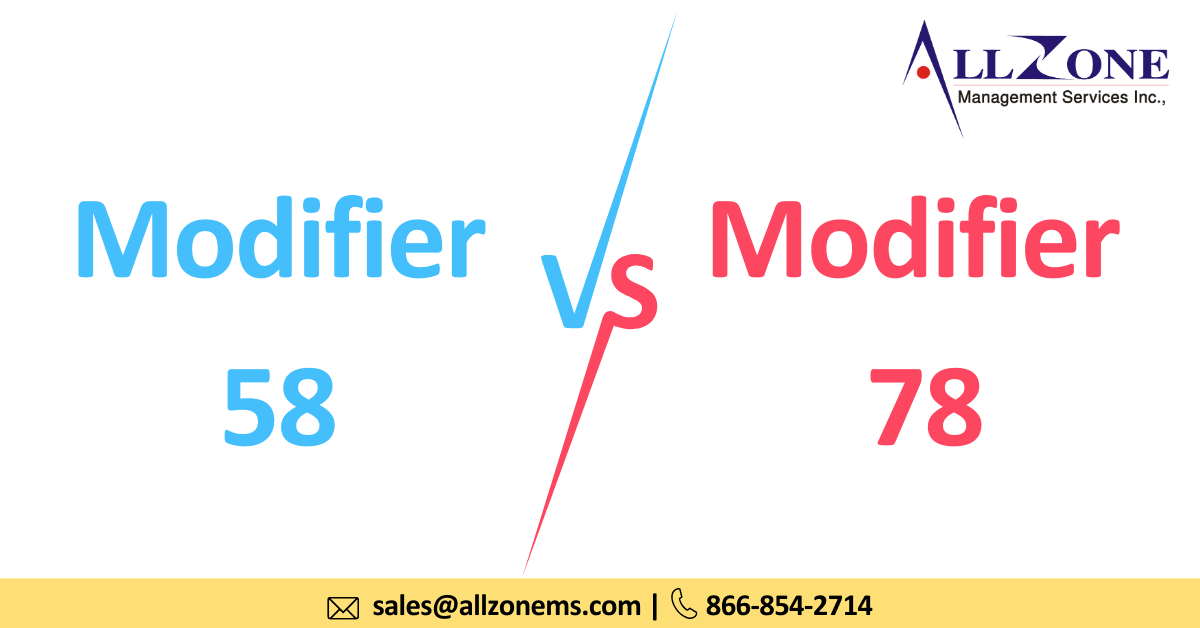Modifier 58 vs Modifier 78:
- Modifier 58: Same underlying condition, planned or unplanned additional procedure.
- Modifier 78: New problem caused by the initial surgery (complication) requiring a return to the OR.
Medical Coders often struggle to differentiate between modifier 58 (staged/related procedure) and modifier 78 (unplanned return to OR). Let’s break down the key differences and usage scenarios for each.
Modifier 58: Staged or Related Procedure
- Used for: Planned or unplanned additional procedures during the postoperative period, as long as they address the same underlying condition as the initial surgery.
- Key Point: Modifier 58 signifies a procedure related to the original surgery, but it can be planned or unplanned.
Planned Staged/Related Procedures:
- Often involve reconstruction after major surgeries where waiting for the global period to end might not be ideal.
- Surgeons can use modifier 58 for each stage within the initial surgery’s global period, allowing separate payment. Each stage typically restarts the global period.
- Example: A pharyngectomy (throat removal) is followed by pharyngoplasty (throat reconstruction) 10 days later. Modifier 58 is added to the pharyngoplasty code to indicate it’s a planned, staged procedure.
Unplanned Staged/Related Procedures:
- Sometimes, a conservative approach doesn’t achieve the desired outcome.
- Modifier 58 allows surgeons to be reimbursed for additional procedures within the global period if needed to address the same problem, even if unplanned.
- Example: A patient undergoes a vascular bypass for gangrenous toes. Debridements (tissue removal) are performed within the global period, but the toes remain gangrenous. At 40 days post-op, an amputation is necessary. Modifier 58 is used for both the amputation (more radical) and the debridements (as the bypass didn’t resolve the gangrene issue).
Modifier 78: Unplanned Return to the Operating Room
- Unlike modifier 58, this deals with a new problem caused by the initial surgery (complication).
- Modifier 78 applies when a complication necessitates a return to the OR for repair/correction.
- Example: In the gangrenous toe case above, suppose the bypass leaks. The surgeon would use modifier 78 on the re-do bypass code since they’re fixing a complication (leak) rather than the original issue (gangrene).
Mastering the Art of Modifier 58 and 78 in Surgical Coding
- Documentation is Key: For proper reimbursement, clear documentation in the operative report is crucial. It should explicitly state if the additional procedure is staged/related (modifier 58) or addresses a complication (modifier 78).
- Coding Guidelines: Refer to the latest Current Procedural Terminology (CPT) coding guidelines for specific requirements and exclusions related to modifier usage.
- Payer Specific Rules: Some insurance payers may have additional rules regarding modifier use. It’s always recommended to check with the specific payer for their policies.
By understanding these distinctions and considering the additional points, coders can ensure accurate use of modifier 58 vs 78, facilitating appropriate reimbursement for surgical services.
5 Reasons Why Physicians Should Leverage Medical Coding Services:
- Expertise and Accuracy: Medical coding is a complex process that requires a deep understanding of medical terminology, procedures, and coding guidelines. Professional medical coding services employ certified coders who are trained to accurately translate medical records into the appropriate codes. By outsourcing this task to experts, physicians can ensure that their coding is done correctly, minimizing the risk of errors and reducing the likelihood of claim denials or audits.
- Time and Resource Savings: Coding can be a time-consuming task for physicians and their staff. Outsourcing medical coding allows physicians to focus their time and energy on patient care rather than administrative tasks. Additionally, outsourcing can save on the costs associated with hiring and training coding staff, as well as investing in coding software and updates.
- Compliance and Regulatory Adherence: Healthcare regulations and coding guidelines are constantly evolving, and it can be challenging for physicians to stay up-to-date with these changes while managing their practice. Medical coding services specialize in staying current with regulatory requirements and can help ensure that physicians remain compliant with coding and billing regulations, reducing the risk of penalties or legal issues.
- Optimized Revenue Cycle Management: Accurate and timely medical coding is essential for optimizing the revenue cycle of a medical practice. Proper coding ensures that claims are processed quickly and accurately, leading to faster reimbursement and improved cash flow. Medical coding services can help streamline the medical billing process, reduce claim denials, and maximize revenue by identifying missed opportunities for reimbursement.
- Focus on Core Competencies: By outsourcing medical coding, physicians can focus on their core competencies and priorities, such as providing high-quality patient care, expanding their practice, or pursuing continuing education. Delegating non-core tasks like coding to professionals allows physicians to work more efficiently and effectively, ultimately improving the overall quality of care provided to patients.

